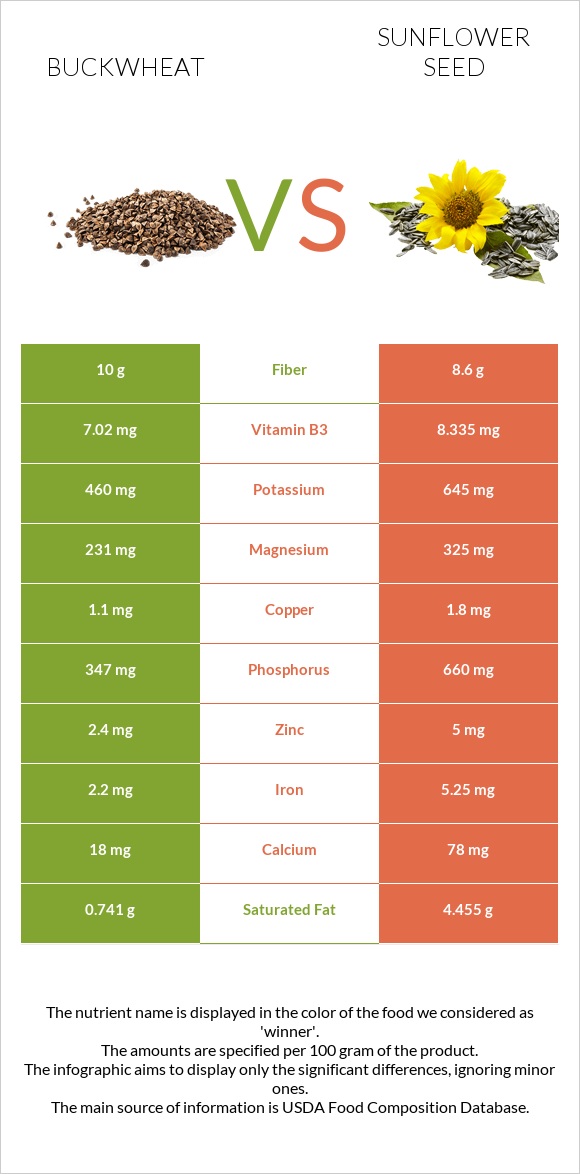Buckwheat vs. Sunflower seeds — In-Depth Nutrition Comparison
Compare
What are the main differences between buckwheat and sunflower seeds?
- Buckwheat has less vitamin E, copper, vitamin B1, vitamin B6, selenium, phosphorus, manganese, magnesium, iron, and folate than sunflower seeds.
- Sunflower seeds' daily need coverage for vitamin E is 234% higher.
- Sunflower seeds have a lower glycemic index than buckwheat.
We used Buckwheat groats, roasted, cooked and Seeds, sunflower seed kernels, dried types in this comparison.
Infographic

Infographic link
Mineral Comparison
Mineral comparison score is based on the number of minerals by which one or the other food is richer. The "coverage" charts below show how much of the daily needs can be covered by 300 grams of the food.
| Contains less SodiumSodium | -55.6% |
| Contains more MagnesiumMagnesium | +537.3% |
| Contains more CalciumCalcium | +1014.3% |
| Contains more PotassiumPotassium | +633% |
| Contains more IronIron | +556.3% |
| Contains more CopperCopper | +1132.9% |
| Contains more ZincZinc | +719.7% |
| Contains more PhosphorusPhosphorus | +842.9% |
| Contains more ManganeseManganese | +383.9% |
| Contains more SeleniumSelenium | +2309.1% |
Vitamin Comparison
Vitamin comparison score is based on the number of vitamins by which one or the other food is richer. The "coverage" charts below show how much of the daily needs can be covered by 300 grams of the food.
| Contains more Vitamin KVitamin K | +∞% |
| Contains more Vitamin CVitamin C | +∞% |
| Contains more Vitamin AVitamin A | +∞% |
| Contains more Vitamin EVitamin E | +38977.8% |
| Contains more Vitamin B1Vitamin B1 | +3600% |
| Contains more Vitamin B2Vitamin B2 | +810.3% |
| Contains more Vitamin B3Vitamin B3 | +786.7% |
| Contains more Vitamin B5Vitamin B5 | +214.8% |
| Contains more Vitamin B6Vitamin B6 | +1646.8% |
| Contains more FolateFolate | +1521.4% |
All nutrients comparison - raw data values
| Nutrient |  |
 |
DV% diff. |
| Vitamin E | 0.09mg | 35.17mg | 234% |
| Copper | 0.146mg | 1.8mg | 184% |
| Polyunsaturated fat | 0.188g | 23.137g | 153% |
| Vitamin B1 | 0.04mg | 1.48mg | 120% |
| Vitamin B6 | 0.077mg | 1.345mg | 98% |
| Selenium | 2.2µg | 53µg | 92% |
| Phosphorus | 70mg | 660mg | 84% |
| Fats | 0.62g | 51.46g | 78% |
| Manganese | 0.403mg | 1.95mg | 67% |
| Magnesium | 51mg | 325mg | 65% |
| Iron | 0.8mg | 5.25mg | 56% |
| Folate | 14µg | 227µg | 53% |
| Vitamin B3 | 0.94mg | 8.335mg | 46% |
| Monounsaturated fat | 0.188g | 18.528g | 46% |
| Zinc | 0.61mg | 5mg | 40% |
| Protein | 3.38g | 20.78g | 35% |
| Calories | 92kcal | 584kcal | 25% |
| Fiber | 2.7g | 8.6g | 24% |
| Vitamin B2 | 0.039mg | 0.355mg | 24% |
| Saturated fat | 0.134g | 4.455g | 20% |
| Potassium | 88mg | 645mg | 16% |
| Vitamin B5 | 0.359mg | 1.13mg | 15% |
| Calcium | 7mg | 78mg | 7% |
| Choline | 20.1mg | 55.1mg | 6% |
| Vitamin C | 0mg | 1.4mg | 2% |
| Vitamin K | 1.9µg | 0µg | 2% |
| Net carbs | 17.24g | 11.4g | N/A |
| Carbs | 19.94g | 20g | 0% |
| Sugar | 0.9g | 2.62g | N/A |
| Sodium | 4mg | 9mg | 0% |
| Vitamin A | 0µg | 3µg | 0% |
| Tryptophan | 0.049mg | 0.348mg | 0% |
| Threonine | 0.129mg | 0.928mg | 0% |
| Isoleucine | 0.127mg | 1.139mg | 0% |
| Leucine | 0.212mg | 1.659mg | 0% |
| Lysine | 0.172mg | 0.937mg | 0% |
| Methionine | 0.044mg | 0.494mg | 0% |
| Phenylalanine | 0.133mg | 1.169mg | 0% |
| Valine | 0.173mg | 1.315mg | 0% |
| Histidine | 0.079mg | 0.632mg | 0% |
| Fructose | 0.1g | 0% | |
| Omega-3 - EPA | 0g | 0.014g | N/A |
Macronutrient Comparison
Macronutrient breakdown side-by-side comparison
Protein:
3.38 g
Fats:
0.62 g
Carbs:
19.94 g
Water:
75.63 g
Other:
0.43 g
Protein:
20.78 g
Fats:
51.46 g
Carbs:
20 g
Water:
4.73 g
Other:
3.03 g
| Contains more WaterWater | +1498.9% |
| Contains more ProteinProtein | +514.8% |
| Contains more FatsFats | +8200% |
| Contains more OtherOther | +604.7% |
~equal in
Carbs
~20g
Fat Type Comparison
Fat type breakdown side-by-side comparison
Saturated fat:
Sat. Fat
0.134 g
Monounsaturated fat:
Mono. Fat
0.188 g
Polyunsaturated fat:
Poly. Fat
0.188 g
Saturated fat:
Sat. Fat
4.455 g
Monounsaturated fat:
Mono. Fat
18.528 g
Polyunsaturated fat:
Poly. Fat
23.137 g
| Contains less Sat. FatSaturated fat | -97% |
| Contains more Mono. FatMonounsaturated fat | +9755.3% |
| Contains more Poly. FatPolyunsaturated fat | +12206.9% |
Carbohydrate type comparison
Carbohydrate type breakdown side-by-side comparison
Starch:
0 g
Sucrose:
0.4 g
Glucose:
0.2 g
Fructose:
0.1 g
Lactose:
0 g
Maltose:
0 g
Galactose:
0 g
Starch:
0 g
Sucrose:
2.5 g
Glucose:
0 g
Fructose:
0 g
Lactose:
0 g
Maltose:
0 g
Galactose:
0 g
| Contains more GlucoseGlucose | +∞% |
| Contains more FructoseFructose | +∞% |
| Contains more SucroseSucrose | +525% |
~equal in
Starch
~0g
~equal in
Lactose
~0g
~equal in
Maltose
~0g
~equal in
Galactose
~0g





